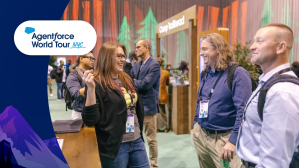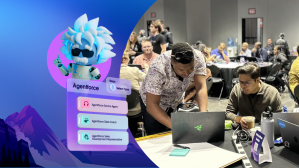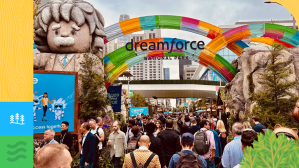The same framework that powers millions of Salesforce apps opens a new era of community innovation
SAN FRANCISCO – TRAILHEADX – May 29, 2019 – Salesforce [NYSE: CRM], the global leader in CRM, today announced it has open sourced Lightning Web Components, the company’s JavaScript framework that makes it easy for millions of developers to build apps on the Lightning Platform. With this update, developers everywhere are now empowered to build fast, secure and portable web components on the development stack of their choice.
Any developer can get started today by visiting https://lwc.dev/ and https://github.com/salesforce/lwc. Salesforce will showcase Lightning Web Components this week at TrailheaDX, Salesforce’s fourth annual developer conference.
“The Lightning Platform has long served millions of enterprise developers building the apps that underpin today’s connected experiences,” said Ryan Ellis, SVP of Product Management, Salesforce. “With Lightning Web Components now open source, we’re empowering the community to build standards-based applications on any platform, and inviting them to help us define what the future of enterprise software looks like.”
The Open Source movement jumpstarts enterprise software
While proprietary software has traditionally ruled the enterprise, industry use of open source software will reach near parity within two years. However, standard enterprise levels of trust and compatibility remain barriers to deployment of open source code, creating gaps of talent and efficiency between companies striving for a digital renaissance and the developers charged with coding it.
By open sourcing Lightning Web Components, Salesforce begins to bridge that gap — bringing community innovation to the world’s #1 CRM. Developer teams can now recruit from larger talent pools to code and rapidly iterate on apps, and businesses can count on those apps to run at enterprise levels of trust, scale and performance.
“Open source software is a leading accelerant for innovation,” said Chris Kelly, Director, Open Source, Salesforce. “With more companies than ever investing in open source, Salesforce is proud to continue its work supporting an open web by empowering developers with an enterprise-ready framework to build the next generation of connected experiences.”
Lightning Web Components: Standards-based, not standardized
With Lightning Web Components now open source, developers everywhere can code with the same standards-based framework to build applications on any platform, using the tools and open languages of their choice. They can explore the source code of Lightning Web Components — including, for example, the enterprise-ready code for compatibility across different web browsers — and customize it based on their unique needs. And most important, this will foster a community of enterprise JavaScript developers who can contribute innovations back to the source code and define the roadmap for Lightning Web Components, driving web standards forward for everyone.
For example, starting today, a Node.js developer building customer engagement apps on Heroku can leverage Lightning Web Components to code a fast, standards-based UI on top of her Node stack, then create a corresponding employee app in Salesforce using the same framework. That developer is also free to examine the code base of Lightning Web Components and contribute her learnings back to the community – putting her thumbprint on the future of Lightning Web Components and enterprise software development.
“Providing compelling digital experiences is at the heart of our customers’ transformation plans,” said Raja Singh, Senior Vice President, Products at Vlocity. “With Lightning Web Components, it’s now much easier for our customers to extend our functionality to meet their unique branding and process requirements without re-coding. Because they leverage native browser functionality, Lightning Web Components also offer improved performance and reduced reliance on third-party JavaScript frameworks.”
“Open source software empowers developers to examine the source code and enhance it with contributions based on their own insights and experience,” said Arnal Dayaratna, research director, Software Development, IDC. “By open sourcing Lightning Web Components, Salesforce is giving enterprises the ability to take advantage of the enhanced innovation enabled by open source software and accelerate application development at a time when the demand for digital solutions exceeds the supply of developers to produce those solutions.”
Additional Information
- Tune into the TrailheaDX keynote to learn more about Lightning Web Components, app dev on the Lightning Platform and more at https://www.salesforce.com/trailheadx/
- For more information on Lightning Web Components, visit https://www.salesforce.com/products/platform/features/.
- To get started today creating Lightning Web Components, visit https://lwc.dev/.
- To learn more about how open source development can jumpstart innovation in enterprise software, see this Q&A with Chris Kelly, Director of Open Source at Salesforce: https://www.salesforce.com/company/news-press/stories/2019/05/052919-x/
- Read more about Lightning Web Components and the journey to open source here: http://developer.salesforce.com/blogs/2019/05/introducing-lightning-web-components-open-source.html
Learn more about Lightning Web Components and open source at these TrailheaDX sessions:
- Build Lightning Web Components Anywhere
- Wednesday, May 29, 4:30 – 5:10 p.m. at Moscone West, Room 2009
- Local Development for Lightning Web Components
- Wednesday, May 29, 4:30 – 4:50 p.m. at Moscone West, Surfside Theater
- The Architecture of Lightning Web Components (Ask the Architects Panel)
- Thursday, May 30, 11 a.m. – 12:10 p.m. at Moscone West, Room 2004
Availability
- Lightning Web Components are now generally available and open source. To create Lightning Web Components in Salesforce, customers will need an Enterprise, Unlimited, Performance or Developer Edition org.
Salesforce Lightning Platform
The Lightning Platform is the world’s most trusted cloud platform for building enterprise apps—powering Salesforce’s own CRM apps, more than 5,000 partner solutions and more than 7 million custom apps built by customers. Salesforce Lightning comprises an intuitive user experience, a component-based programming model for building custom experiences, and an ecosystem of apps and components available on the AppExchange. With Lightning, everyone is more productive—end users when they work, admins when they customize and developers when they build. For more information visit: https://www.salesforce.com/products/platform/overview/
About TrailheaDX
Adventure Awaits at TrailheaDX: Dedicated to Clicks, Code and People Who Create. TrailheaDX, Salesforce’s fourth annual developer conference, takes place May 29-30 in San Francisco, with 200+ technical sessions, 20+ topics covered in hands-on workshops and 8 bootcamp tracks for Salesforce developers, administrators and architects. The event is designed to empower a new generation of developers to create connected experiences, build apps fast and skill up. For more information, please visit: https://www.salesforce.com/trailheadx/
About Salesforce
Salesforce helps organizations of any size reimagine their business with AI. Agentforce — the first digital labor solution for enterprises — seamlessly integrates with Customer 360 applications, Data Cloud, and Einstein AI to create a limitless workforce, bringing humans and agents together to deliver customer success on a single, trusted platform. Visit www.salesforce.com for more information.












